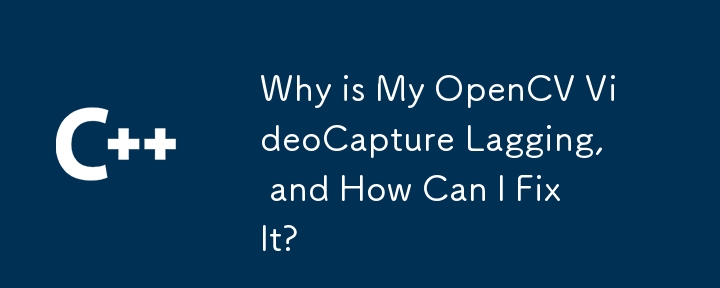Home >Backend Development >C++ >Why is My OpenCV VideoCapture Lagging, and How Can I Fix It?
Why is My OpenCV VideoCapture Lagging, and How Can I Fix It?
- Mary-Kate OlsenOriginal
- 2024-11-05 17:40:021036browse

OpenCV VideoCapture Lag Due to the Capture Buffer
Capturing video through a webcam can involve a lag due to the capture buffer, where frames are stored before being read. This issue arises when the rate at which frames are read is slower than the rate at which they are captured, leading to an accumulation of frames in the buffer.
OpenCV Solution
In OpenCV, you can set the buffer size of a VideoCapture object using CV_CAP_PROP_BUFFERSIZE:
<code class="cpp">cv::VideoCapture cap; cap.set(CV_CAP_PROP_BUFFERSIZE, 3); // Store only 3 frames in the buffer</code>
Hackaround 1
If the OpenCV solution doesn't work, you can use this hackaround:
- Measure the time it takes to query a frame from the buffer.
- If the time is low, discard the frame as it was read from the buffer.
- Continue querying frames until the time exceeds a limit, indicating that the buffer is empty and the next frame is up to date.
Hackaround 2
Another hackaround involves using a third thread to grab frames continuously at a high speed to keep the buffer empty:
- Create a third thread that calls cv::VideoCapture.grab() to fetch frames.
- Use a spin lock to synchronize the reading of frames between the worker thread and the third thread.
The above is the detailed content of Why is My OpenCV VideoCapture Lagging, and How Can I Fix It?. For more information, please follow other related articles on the PHP Chinese website!
Related articles
See more- C++ compilation error: A header file is referenced multiple times, how to solve it?
- C++ compilation error: wrong function parameters, how to fix it?
- C++ error: The constructor must be declared in the public area, how to deal with it?
- Process management and thread synchronization in C++
- How to deal with data splitting problems in C++ development

